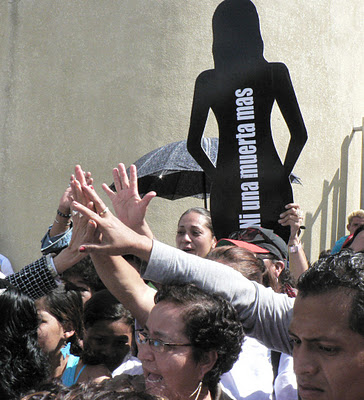WELCOME TO THE ARCHIVE (1994-2014) OF THE MAQUILA SOLIDARITY NETWORK. For current information on our ongoing work on the living wage, women's labour rights, freedom of association, corporate accountability and Bangladesh fire and safety, please visit our new website, launched in October, 2015: www.maquilasolidarity.org
February 6, 2012
 On January 26, the Nicaraguan Parliament unanimously approved a Comprehensive Violence Against Women Act, a victory for women's organizations that have long struggled to bring attention to this issue. The new law represents an important step towards addressing the serious problem of gender-based violence that is facing Nicaragua.
On January 26, the Nicaraguan Parliament unanimously approved a Comprehensive Violence Against Women Act, a victory for women's organizations that have long struggled to bring attention to this issue. The new law represents an important step towards addressing the serious problem of gender-based violence that is facing Nicaragua.
The law recognizes femicide (killing of women) and other forms of violence against women as criminal acts and makes them punishable by law. The other forms of violence that are clearly delineated in the law include physical, psychological, sexual, property and economic, and workplace violence as well as misogyny and violence against women perpetrated by government officials.
The law calls for the creation of an inter-institutional commission to address this issue, the strengthening of government agencies that provide services for women and children, and provision of training and information for government officials and for the public as a whole about issues of violence against women. The Nicaraguan Parliament also approved a reform to the Penal Code that increases the maximum sentences for femicide and other acts of violence against women.
The new law is a victory for those who have long been advocating for women's rights. The bill was proposed in October 2011 as the culmination of an extensive process in which 2,500 female victims of violence gave their testimonies and expressed the need for of a special law that would put an end to violence against women in Nicaragua.
Sandra Ramos, President of the "Maria Elena Cuadra" Movement for Working and Unemployed Women (MEC) said, "This law sets an important precedent in Nicaragua's history because, for the first time, the State is recognizing all types of violence against women, not just domestic violence. There is no doubt that this was worthwhile and it will be an important and long-awaited instrument that we can use to advocate for women's rights. The one thing that still hurts is that 800 women have been assassinated in Nicaragua during the past ten years."
The passage of this act is symbolic not only for Nicaragua, but for women's rights advocates throughout the Americas, where the problem of femicide is a growing concern.